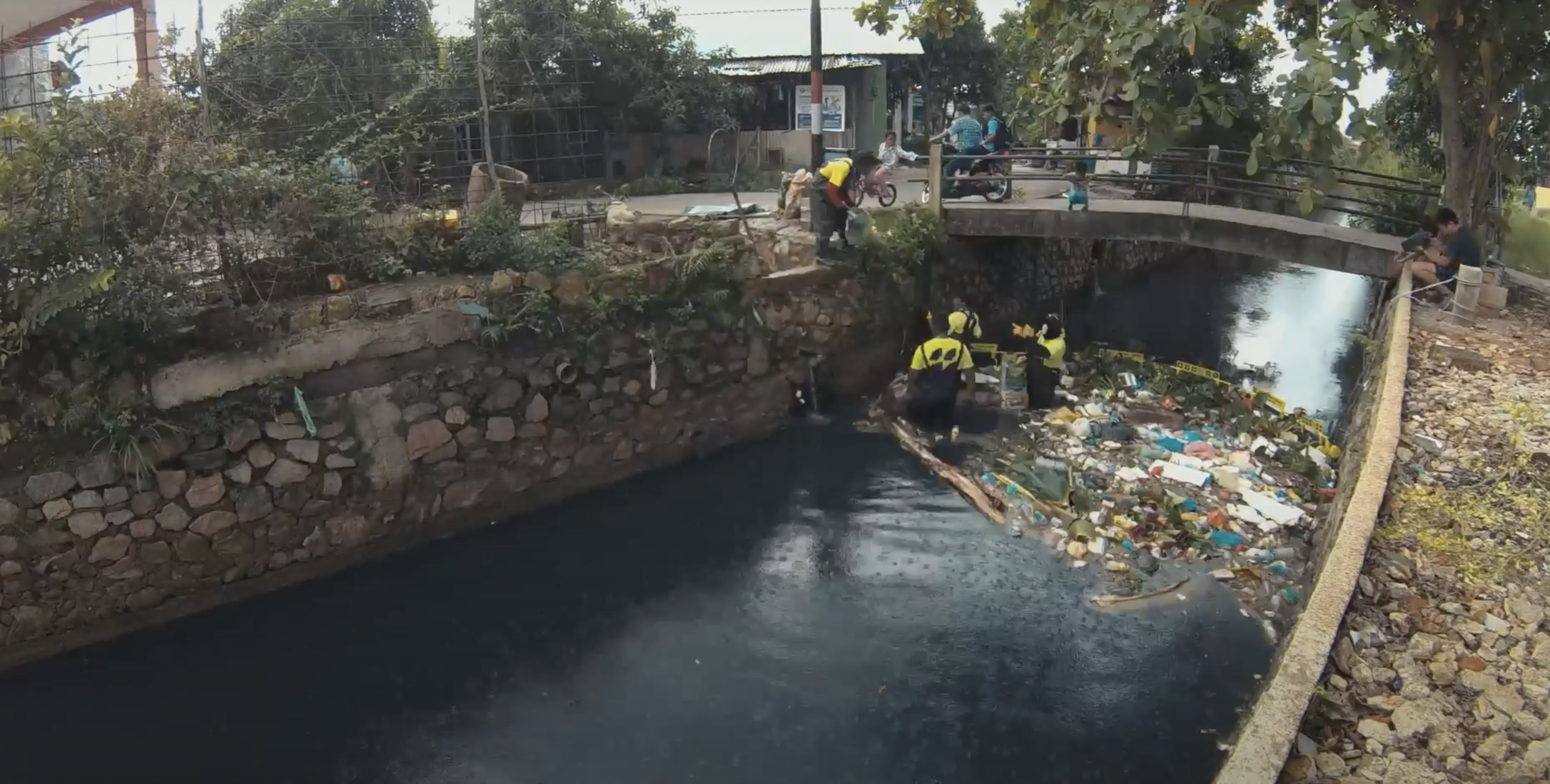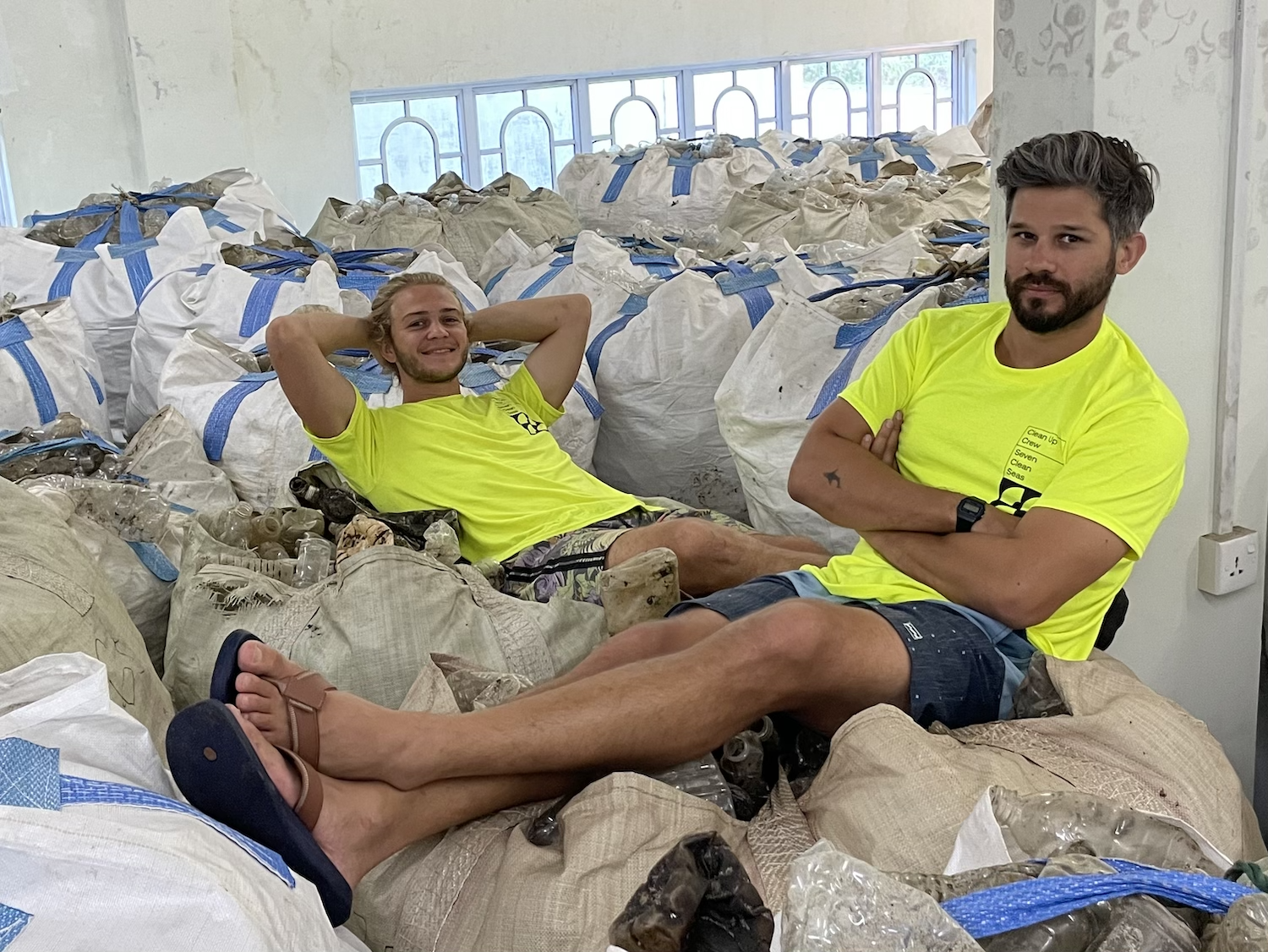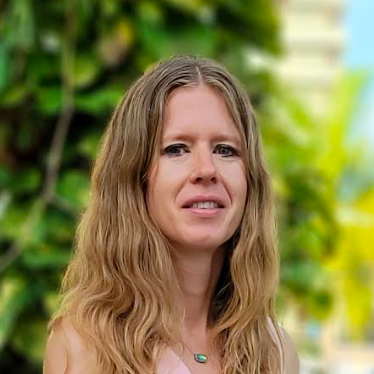
A Seven Clean Seas beach cleanup in Indonesia. (Image courtesy of Seven Clean Seas)
Rivers of plastic are flowing into the ocean — literally. A garbage truck's worth of plastic enters the ocean every minute, according to the World Economic Forum. Much of that sinks or ends up in coastal environments, but some escapes to the open ocean. Once there, the primarily non-biodegradable junk can last for a long time, from decades to centuries. To make matters worse, the amount of plastic entering the ocean is predicted to triple by 2040, to 29 million metric tons a year, if nothing is done.
A growing pool of innovators are focused on cleaning up this floating junkyard from the world’s oceans, including those behind Seven Clean Seas. Based in Southeast Asia, ocean impact organization built a business around environmental cleanup, social responsibility and the circular economy. Led by a pair of young co-founders, it’s forging a trail to a better future for the environment and local communities.
Seven Clean Seas’ approach to ocean plastic
With the tagline “Because the sea is f***ing awesome,” this offbeat company is serious when it comes to plastic pollution. It started with coastal cleanups in Indonesia, which is marred by plastic floating in from the South China Sea or dumped by local coastal and fishing communities.
“We quickly realized that it was extremely efficient to focus on coastal communities where leakage is high,” said Tom Peacock-Nazil, CEO and co-founder of Seven Clean Seas. “We find a coastal community with a thousand households, and no waste management, period."
The company's work, like the plastic waste crisis itself, has a strong social component. "The issues around waste are also social injustice issues since not everybody has access to waste management, which should be a basic human right. And it disproportionately affects the poorest communities," Peacock-Nazil said. "So, we move in and hire people from the community — we won't bring in outsiders.”
Its track record is impressive, having recovered more than 1.8 million kilograms (or nearly 4 million pounds) of plastic since 2018, with the aim to recirculate that mountain of trash for further use. Recovered plastic is sent to a newly constructed materials recovery facility on the island of Bintan, Indonesia, where it’s sorted for either recycling or processing.
Unfortunately, it’s much more of the latter than the former. Only 5 percent of the recovered plastic can be recycled since, ultimately, most plastic is not recyclable, Peacock-Nazil said.
For the other 95 percent of the waste it collects, Seven Clean Seas had to be creative. For instance, it made investments to turn plastics into construction materials like cinder blocks. This material outperforms concrete while also avoiding the carbon emissions from concrete production, Peacock-Nazil said. Wood alternatives can also be made from some of the harder plastics.

Capturing rivers of plastic pollution
In a parallel effort, the company is looking to stem the tide of plastic entering the ocean from rivers. A significant amount of ocean plastic pollution — up to 2.4 million metric tons each year — can be traced to rivers. Seven Clean Seas is testing a large-scale floating barrier on the Chao Phraya River in Thailand. This device captures plastic but only extends about a meter into the water, allowing marine life to pass underneath.
“We’re partnering with a Thai Buddhist temple, Wat Chak Daeng,” Peacock-Nazil said. “These monks are already recycling [plastic] bottles from their local community into polyester fabric and wearing that in their monks' robes. They're really in circularity, in waste management, and have a fully functioning materials recovery facility behind their temple." Waste collected from the Chao Phraya barrier will go to the temple's recovery center to be put to a second use. "It's going be a very exciting project," he said.

Employment in the waste management sector
In addition to its environmental record, Seven Clean Seas also offers fair employment in regions where it can be hard to find. “Where we operate, most people have informal employment. They don’t have safe working conditions, and they’re not covered under social security — no one’s got their back,” Peacock-Nazil said. “If they injure themselves, they can’t go to work the next day and put food on the table. The United Nations has said that the informal sector of waste management is filled with indentured labor, which is slave labor essentially, and also child labor. It’s a really nasty sector.”
In stark contrast to this bleak picture, Seven Clean Seas provides paid holidays, maternity leave, health insurance and pension benefits for its staff. It also has a five-day workweek.
“We basically treat them the way I’d expect to be treated, and that’s really important to us,” Peacock-Nazil said. “We started Seven Clean Seas as an environmental organization, clearly, but we realized that we provide just as much social impact as we do environmental impact. That’s something I’ve become quite proud of.”
Besides a commitment to hiring from local communities, the company also aims for half of its cleanup and operations employees to be women. And teams work on an educational basis with schools, community groups and religious leaders to raise awareness of plastic pollution.
![[Seven Clean Seas] Bengkong Boat Cleanup - removing plastic pollution in indonesia](https://back.3blmedia.com/sites/default/files/inline-images/%5BSeven%20Clean%20Seas%5D%20Bengkong%20Boat%20Cleanup%20-%20removing%20plastic%20pollution%20in%20indonesia.jpeg)
How can companies contribute to cleaning up plastic?
Ways to reduce pollution are as numerous as the plastic sacks floating in the sea. In terms of financial support, Seven Clean Seas is among the organizations spearheading the sale of plastic credits. This system rewards companies for supporting plastic removal work in places without waste management infrastructure. Similar to carbon credits, companies pay for the removal of one metric ton of plastic from the environment and receive a net reduction in their overall plastic footprint, the amount of plastic waste generated per year. Seven Clean Seas also helps organizations measure and reduce their plastic footprints, while offering best practice protocols on plastic credits.
But, of course, purchasing things like plastic credits is no substitute for companies taking steps to directly transition away from single-use plastics by using more recyclable and recycled plastic and looking toward alternative materials.
Making recycling easier for consumers is another way businesses can pitch in. How2Recycle designed a standardized labeling system with clear instructions for recycling products and packaging. So far, over 400 brand owners and retailer members joined this initiative.
Companies can also join coalitions working to combat plastic pollution, like the Plastic Pollution Coalition. Another example is a collaboration across retail sectors called the Beyond the Bag Initiative. Companies including Target, Kroger and Dollar General aim to reduce the 100 billion plastic bags used every year in the U.S.
Finally, in addition to Seven Clean Seas, businesses can support one of the many organizations focused on reducing plastic pollution.
We’ve produced an astounding 6.3 billion metric tons of plastic waste to date. However, organizations like Seven Clean Seas are chipping away at that behemoth. And, just as important, they’re doing so with a sense of social responsibility extending far beyond the environment.
Images courtesy of Seven Clean Seas

Ruscena Wiederholt is a science writer based in South Florida with a background in biology and ecology. She regularly writes pieces on climate change, sustainability and the environment. When not glued to her laptop, she likes traveling, dancing and doing anything outdoors.














